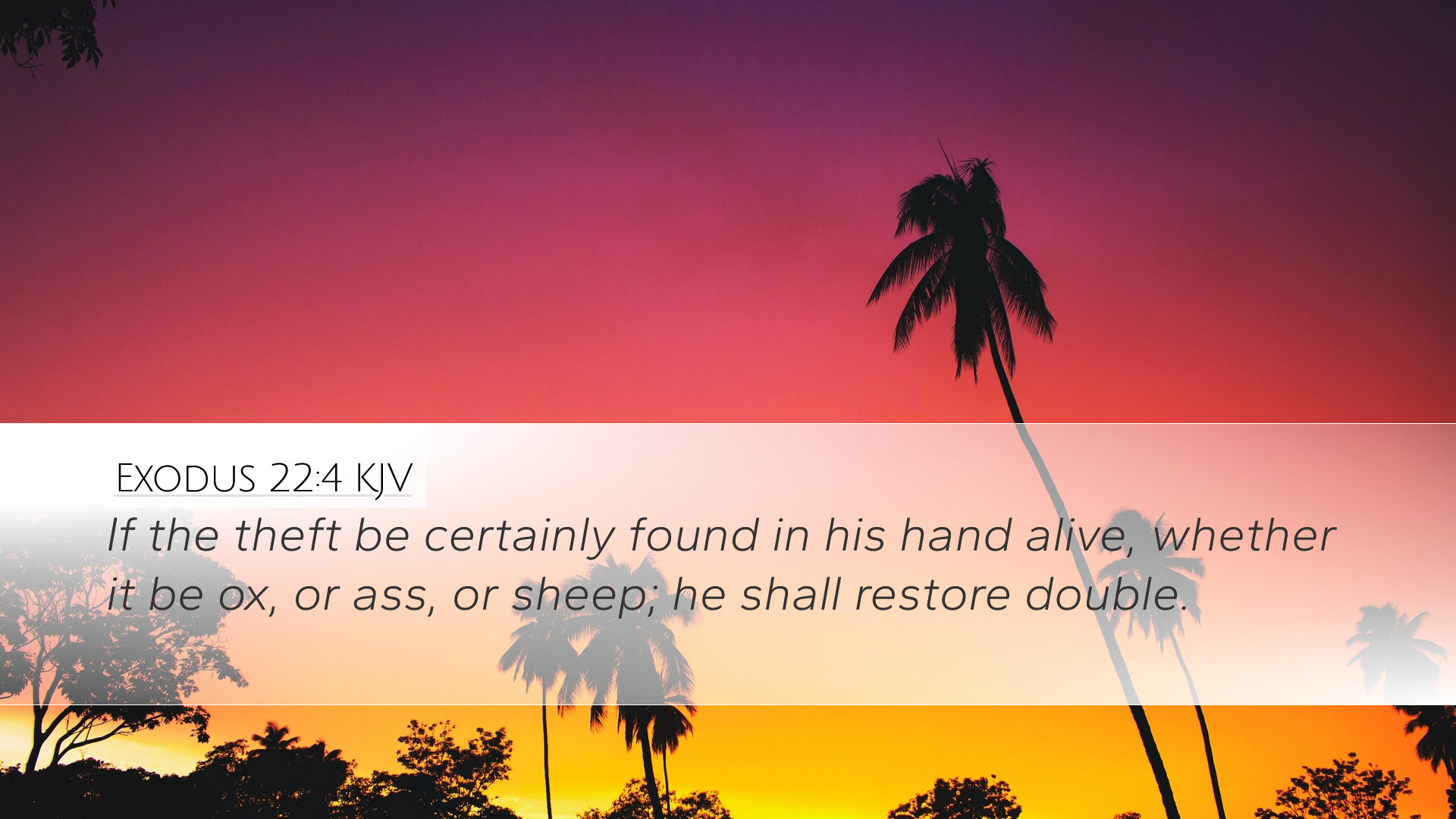Commentary on Exodus 22:4
Verse Overview: Exodus 22:4 states, "If the theft be certainly found in his hand alive, whether it be ox, or ass, or sheep; he shall restore double." This verse addresses the law concerning theft and restitution in ancient Israelite society.
Historical Context
The laws given in Exodus, including this particular verse, were established during the covenant between God and Israel after their exodus from Egypt. The Mosaic Law was intended to provide structure, justice, and a moral framework for the community. In ancient Israel, property rights were paramount; thus, theft was taken seriously.
Insights from Matthew Henry's Commentary
Matthew Henry emphasizes the principle of justice that underlies the commandments regarding theft. He points out that when a thief is caught with the stolen goods, immediate restitution is mandated, reflecting God's righteous nature in requiring accountability and compensation.
- Double Restoration: Henry interprets the requirement to return double as a deterrent against theft, signaling the importance of honesty and integrity in society.
- Value of Property: He reflects on the significance of the property, noting that livestock such as oxen, donkeys, and sheep represented vital assets for agrarian communities.
Albert Barnes' Perspective
Albert Barnes provides additional insights on the implications of this law. He notes that the requirement to restore double serves not only as restitution to the victim but also as a form of public deterrence against theft.
- Public Justice: Barnes argues that public justice, ensured by such laws, maintains societal order, which is critical for community cohesion.
- Economic Stability: He elaborates on how the restitution laws encourage economic stability, as they protect property rights and promote trust among individuals.
Adam Clarke's Understanding
Adam Clarke focuses on the spiritual implications of theft and restitution. He underscores that theft violates not just societal norms but also divine commandments. Clarke states that the thief's punishment serves as an example of God’s justice and mercy.
- Divine Justice: Clarke emphasizes that God's laws reflect His character; thus, restitution is required as an acknowledgment of wrongdoing.
- Spiritual Consequences: He also discusses the spiritual consequences of theft, suggesting that stealing represents a lack of trust in God’s provision.
Theological Implications
This verse and its commentary insights extend into various theological discussions pertinent to pastors, students, and scholars:
- Justice vs. Mercy: The requirement for double restitution poses a tension between justice and mercy, prompting discussions on how these attributes coexist in God's nature.
- Ethics of Ownership: It raises ethical questions regarding property rights, stewardship, and the responsibility believers have to others in their community.
- Application to New Testament Teachings: The New Testament echoes these themes, particularly in discussions about restitution and the behavior expected of Christians (e.g., Zacchaeus the tax collector's restoration).
Practical Applications for Today
For modern readers, particularly pastors and students of the Word, there are several vital applications of Exodus 22:4:
- Accountability: Encourage congregations to embrace accountability in personal and communal matters, reflecting God's justice through honest dealings.
- Restoration: Emphasize the importance of restoration in relationships and communities, recognizing the need for making amends for wrongs committed.
- Trust in God: Teach that theft or dishonest gain ultimately reveals a lack of trust in God’s provision and faithfulness.
Conclusion
Exodus 22:4 serves as a timeless reminder of the importance of justice, accountability, and the high value of integrity in our dealings with others. By reflecting on the insights from historical commentaries, modern-day readers can appreciate the intricate relationship between divine law and ethical living, encouraging a faithful witness in a world often marked by dishonesty.


